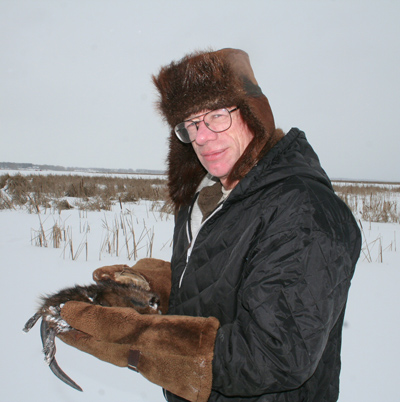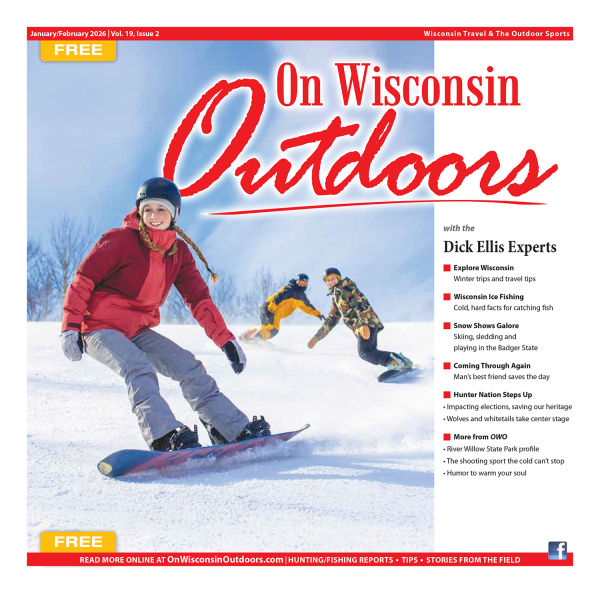“HOME AGAIN…. Wounded veteran grateful for Wisconsin’s outdoors”
Not yet out of the woods…but on the ice trapping in the oh-so-sweet, bitter cold of Wisconsin, Arnold Groehler is home again. Firearms wounds and lungs damaged by the poison gas of a suicide bomber’s explosives in Iraq will take more time and more expertise of American doctors to heal. But on Big Muskego Lake Saturday checking his circuit of 50 muskrat traps in the face of blowing snow, Groehler knows that home is where the heart is.
“I missed opening day deer hunting the most,” said the 50 year old retired army veteran from Oconomowoc called back to active duty. “I was in Iraq but I knew when it was legal shooting hours and I just couldn’t concentrate on what I was doing. I knew that I belonged somewhere else. And I knew when temperatures hit 130 degrees over there that I would never complain again about it being too cold.”
On Big Muskego trapline Saturday, Groehler discussed in part world economics and the correlation with the Wisconsin trapper, the current fur market and the correlation too between being a Wisconsin outdoorsman and survival in combat. But the discussion took place where he most longed to be. As his wife, Jan said last week in an e-mail as this reporter attempted to track the recovery of an old friend, “Arnie is trapping, trapping….and trapping.”
“The whole world is globalized and this financial mess affects even the trapper in Wisconsin,” said Groehler as he pulled a sled laden with equipment toward the distant cattail stands and circuit of muskrat traps already set. When the wealthy people who buy the furs for next year’s garments don’t do well the whole industry becomes uncertain.”
Groehler said that the trapper produces the raw product, which is purchased by fur brokers, or “speculators” who have received orders from retail purchasers. At the North American Fur Auction (NAFA) held in Toronto January 7, to protect the interest and livelihood of the trapper, a decision was made not to allow furs to sell at just any price. As a result only 40 percent of the furs on hand in Toronto for purchase by fur brokers from around the globe were sold. The demand for fur in Russia and China for hats and coats, for example, is enormous with a common Russian owning four to five fur hats.
“If the industry goes bad world-wide the guys holding product don’t like that,” said Groehler, who was re-elected by write-in vote to the Board of the Wild Fur Shippers Council despite his long absence out-of-country. “They want a quick turn-around of product. It’s a buyer’s market and a challenging year for both trappers and wildlife.”
A severe winter last year, he said, resulted in severe losses for many species of animals. The ensuing high-water spring also took devastating tolls on wildlife species from upland birds to furbearing animals. Muskrat young, for example, were literally swept away in turbulent waters leaving approximately one-half the population of the previous year. Raccoon numbers declined about one-third.
Then in fall we had two weeks of good weather before the snows came right back,” Groehler said. “Many trappers say they’ll trap no matter what and it will be interesting to see with this market if that happens. Historically when the value of pelts is higher there are more trappers. Normally there will be three or four trappers working Big Muskego. This year there is only one other guy out here. Trappers are regular sportsmen too. Wisconsin has a tremendous number of outdoor activities. When the money for fur is down, trappers go fish or hunt instead.”
It is his own experiences and developed skills as a hunter and trapper and the skills of other outdoorsmen from around the country that saved Groehler’s life several times in Iraq. Groehler was able to visually locate trip lines inside houses leading to explosive and spot disturbances in the road soil even from a moving vehicle that revealed Improvised Explosive Devices (IED). As another example, a North Dakota pheasant hunter was so proficient snap-shooting that he was able to foil enemy snipers’ numerous rooftop assaults and protect his fellow soldiers with deadly accuracy.
“In combat outdoor skills really stand out,” he said. “Shooting skills, being able to move and not be seen are direct principles that a hunter or trapper learns. IEDs are a real problem. As a trapper I knew when I saw a disturbance in the sand. When I’m coyote trapping I need the trap to be blended and hidden in the soil. The insurgents did the same thing and tried to channel us toward the explosive. I could see that from a distance, sometimes at 70 miles per hour.”
 |
| “Success. A first Big Muskego lake muskrat is held by Arnold Groehler. The Wisconsin trapper from Oconomowoc caught 15 muskrats during this January 10 circuit check on 50 set traps.” |
On the ice Saturday, Groehler wears the 20 year old hat made from a 70 pound beaver he personally trapped. His beaver skin gloves, made in 1891 and willed to him by a Cree Indian Elder, late friend and Board representative of Native Canadian Indians on the Wild Fur Shippers Council, are amazingly intact. He is literally wearing his livelihood for warmth and comfort in a demanding environment.
“The fur industry won’t go away,” he said. “It’s an industry of luxury garments with peaks and valleys. Now the industry is down but it will come up again, a pattern seen over hundreds of years. I read an article in Hudson Bay Company magazine written in the 1700s that said the fur industry is dead because a new trade route from the Far East Indies was bringing silk to England. Fur is very resilient. It’s attractive and keeps you warmer.”
“Because the mink prices kept going back up it took me 20 years to keep enough pelts to make my mother a coat. Now with the market low, the women in my family are placing their orders for garments. Trappers will tend not to sell their furs during a year like this but take care of their own needs with the furs.”
Groehler leads the way Saturday. The catch is down. Two days before, 18 muskrats had been taken from the 50 traps. Today there will be 15 “rats”. His trapline, marked by colored flags ripping in a hard wind and snow, show the way over several miles. The route will take six hours to check and re-set traps. It is Wisconsin-cold. Groehler is still in pain from operations and wounds. But he is home. He is also alive. And he is acutely aware of it.
“They say that you don’t start living until you almost die,” Groehler said. “You see things a little clearer. The fog is lifted. You know how precious every day really is. I’ll never sleep-in again. I’ll try to live and experience as much as I can each and every day. Some people ask me how I could survive what I did.”
“I know my outdoor skills helped me….I also know it pays to go to church.”
Download On Wisconsin Outdoors pdf Home Again






